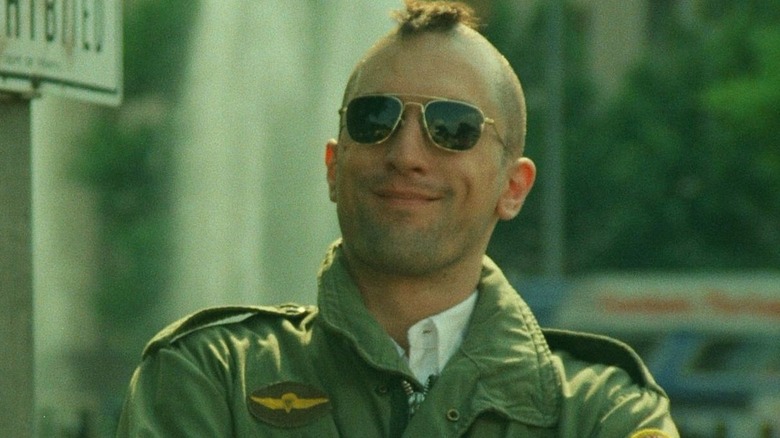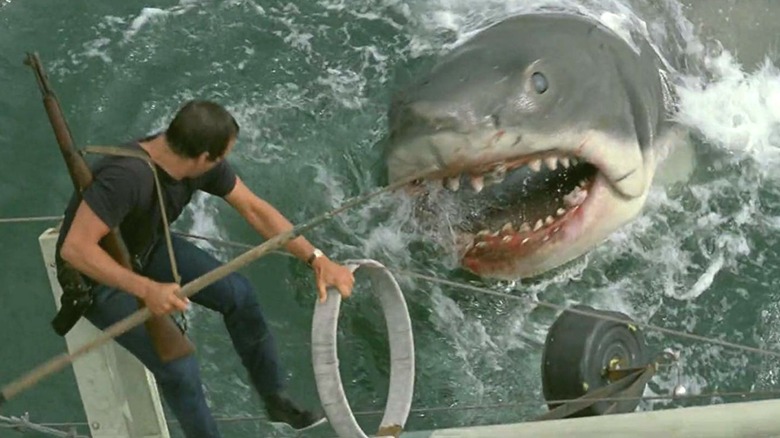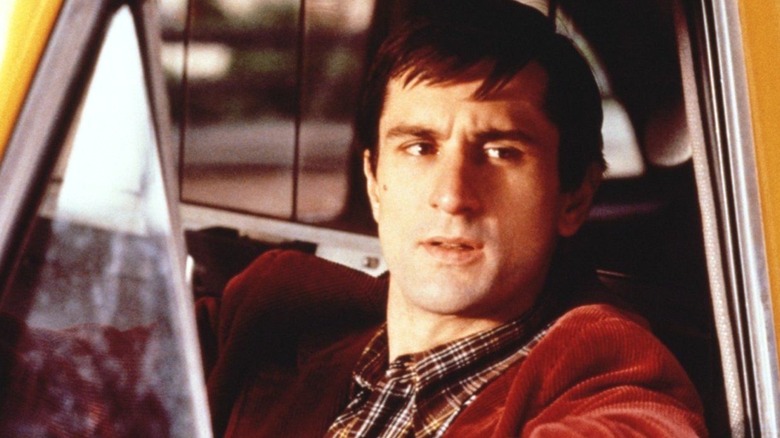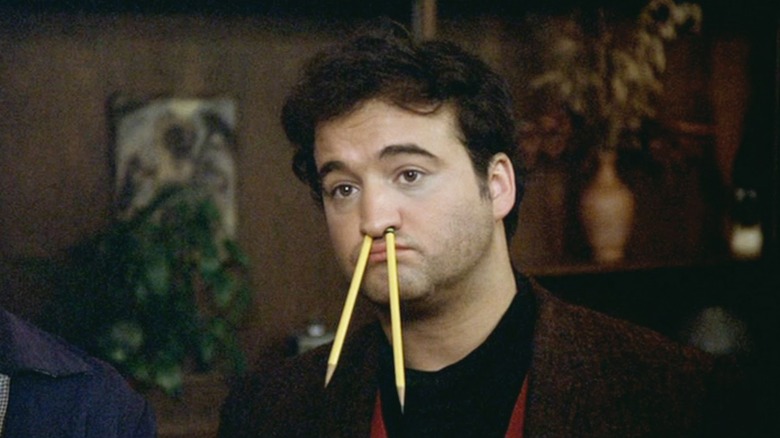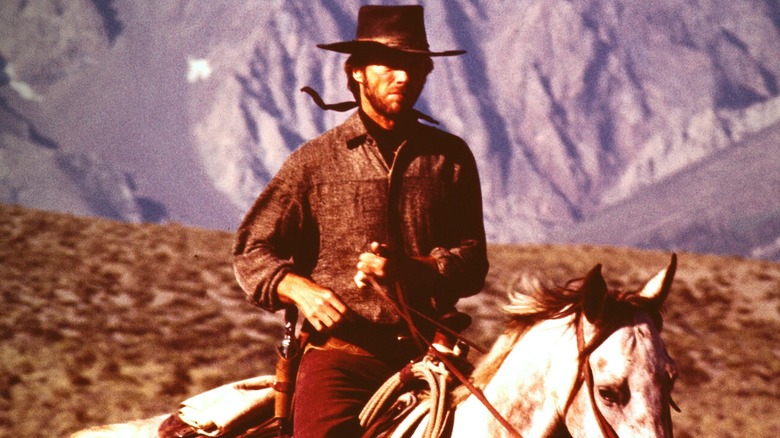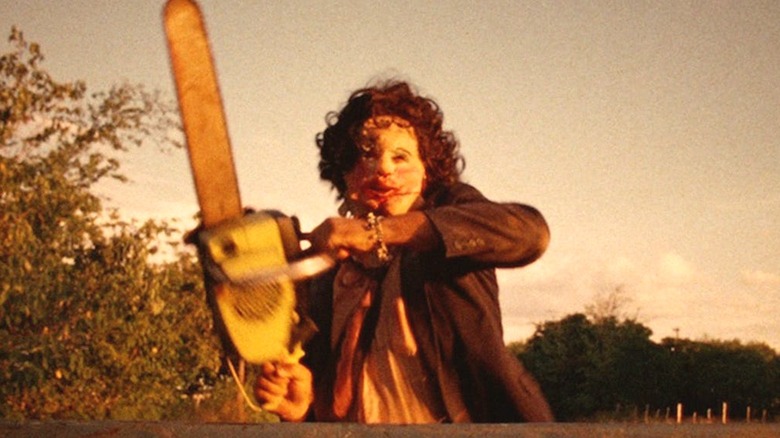The 5 Best '70s Movies Streaming On Netflix
The 1970s may have ended nearly 50 years ago, but the decade is remembered fondly for featuring some of the best movies ever made. Looking back, you'll find the likes of "Star Wars," the first two films in "The Godfather" franchise, and "Halloween." There are tons of excellent movies from the '70s that are as enjoyed now by new viewers as they have been for decades by long-time fans.
These days, audiences enjoy a convenience that original '70s movie viewers lacked: streaming. Netflix is the OG in that arena, and the platform features some amazing movies. Unfortunately, none of the aforementioned films are on the service, thanks to licensing deals that can make it difficult to know which service has the movie you're looking for. "Star Wars" is on Disney, which is gobbling up every franchise it can, and many of the decade's best films are on other streaming services.
Fortunately, there are still some exceptional examples from the decade on Netflix. Unfortunately, you can't search for decades or individual years to make it easier to sift Netflix's catalogue. At least we can offer our pick of the five best films from the 1970s streaming on Netflix. These cover multiple genres, and many are considered some of the greatest movies ever made.
Jaws
Before "Jaws" hit theaters in 1975, the concept of a summer blockbuster wasn't a thing. "Jaws" changed that, making a massive summer release something moviegoers began expecting. That's remained true ever since. The film about a killer great white shark terrorizing a tourism-driven beach community in New England was so well-executed that it made people actually scared to go back into the water. Add to that an elegant yet frightening score by John Williams, and "Jaws" is one for the ages.
There have since been three "Jaws" sequels, but none match the gravitas of the original, which went on to inspire filmmakers for generations. Director Steven Spielberg had plenty of trouble getting the mechanical "Bruce" shark props to function, which is why it features so little screentime. This wasn't the plan, but the prop's failure elevated the tension, as viewers barely caught glimpses of the massive beast until it was too late. Only "Alien" would execute this peekaboo tactic as finely.
Today's shark movies employ CGI-animation, which often look real, but there's something to be said about practical effects. They have a way of creating a visceral fear in the audience, and Bruce accomplished this with aplomb. The film won three Academy Awards and is easily the most historically significant shark movie ever made — much to writer Peter Benchley's chagrin. You can watch it on Netflix, but be quick about it, as the film will swim out of Netflix's stream on November 15, 2025.
Taxi Driver
Robert De Niro was in some of the best movies of his career in the 1970s, as "Mean Streets," "The Godfather Part II," and "The Deer Hunter" were all released during the decade. Another of his best films, "Taxi Driver," hit theaters in 1976, and few men have looked into a standing mirror and not asked, "You talking to me?" in his voice ever since. Director Martin Scorsese takes Marine veteran Travis Bickle (De Niro) out of the jungles of Vietnam, placing him into a cab in New York City.
Needless to say, the transition doesn't happen without a great deal of violence, and his is only one of several brilliant performances in the movie. De Niro is joined by Cybil Shepherd, Harvey Keitel, and Jodie Foster in this gritty neo-noir thriller. The movie was controversial from the day of its release, and for good reason. Foster, who was 12 at the time, plays a prostitute whom Travis decides to save by any means possible.
It's a gritty story that's mired in violent imagery, and it even inspired John Hinkley Jr. to attempt the assassination of President Ronald Reagan in 1981. Overlooking that detail (good luck, it left a mark on history), you're left with one of the decade's best thrillers. "Taxi Driver" remains a culturally significant work to this day. The film received four Academy Award nominations, but won none, losing best picture to "Rocky." Foster received her first nom for "Taxi Driver," making the film her breakout.
National Lampoon's Animal House
College comedies like "American Pie" entertained plenty of viewers around the turn of the century, but there's little chance they'd exist were it not for "Animal House." Granted, the film didn't launch the genre. 1925's "The Freshman" holds that honor. "Animal House" did up the game to its raunchiest levels yet when it released in 1978. The film embraces the decade's penchant for exploitative nudity, hilarious hijinks, and the bucking of authority with its considerably funny delivery. The flick centers around the antics of the members of the Delta Tau Chi fraternity, who run afoul of the school's dean.
The movie helped define gross-out humor, following John Landis' previous success with "The Kentucky Fried Movie" the year before. In addition to its director, "Animal House" offered plenty of talent, most notably in John Belushi's Bluto. His uncouth manner and disinterest in anything outside of Dionysian levels of drinking and fun carry the chaotic plot amidst the number of would-be academics trying to balance school with enjoying life.
Joining Belushi are Tim Matheson, Tom Hulce, Donald Sutherland, Kevin Bacon, and Karen Allen, packing the film with talent. "Animal House's" influence is evident in many comedies that followed, be they "PCU," "Van Wilder," or "Old School." There's even an episode of "Futurama" spoofing its premise. "Animal House" also launched the National Lampoon franchise, giving the world the "Vacation" flicks that moviegoers have enjoyed for years.
High Plains Drifter
Clint Eastwood kicked off the Spaghetti Western genre alongside director Sergio Leone in 1964's "A Fistful of Dollars." That movie helped make Eastwood a feature film star, as he'd previously been best known for his appearances on "Rawhide." Eastwood headlined many Westerns throughout his career, and one of the best to come out of the 1970s is 1973's "High Plains Drifter." As is often the case, Eastwood plays an unnamed stranger who comes to a mining town to mete out some frontier justice.
Unlike the Spaghetti Westerns of the 1960s, which were primarily shot in Italy, "High Plains Drifter" is an American production, which Eastwood personally directed around Mono Lake, California. While the film isn't Eastwood's directorial debut, it is his most successful early directing effort, having previously filmed "Play Misty for Me," as well as one sequence in "Dirty Harry," which was otherwise directed by Don Siegel.
This is, however, Eastwood's first time in the directing chair for a Western, a genre that has served the actor well. Siegel and Leone were influences for Eastwood in "High Plains Drifter," and he included a funny tribute to the two directors in the movie's cemetery. Two tombstones with their names etched into the stone are clearly visible, and their inspiration is just as apparent in the movie's structure and narrative. "High Plains Drifter" remains an important Western through its impact on the genre, as well as a brilliant revenge flick worthy of praise.
The Texas Chain Saw Massacre
Slasher films have been around since Alfred Hitchcock's "Psycho" unleashed Norman Bates (Anthony Perkins) and his mother in 1960. Still, it wasn't until the 1970s that the genre found solid footing with films like "Halloween." While an excellent example, one cannot overlook one of the best horror movies of the 1970s that you need to watch: "The Texas Chain Saw Massacre." It is transformative of the genre, helping to kick off the golden age of slasher films. It was shot for around $140,000, which is impressive given its box office take of nearly $31 million. Those numbers are why horror movies are often successful. They're cheap to make and easy to profit from — but few come close to the level of success as this film.
"The Texas Chain Saw Massacre" is about a small group of friends who find themselves running into a family of cannibals, including Leatherface (Gunnar Hansen), who has a penchant for dispatching future feasts with his signature chainsaw. The film has often been cited as being based on a true story, and while it was inspired somewhat by the serial killer Ed Gein, calling it anything but fiction is a fib.
Regardless, there's no denying the impact and influence of "Massacre," as future slasher films took cues from its narrative structure and grotesque visuals. Even "Halloween," one of the greatest horror films of all time, owes a hefty chunk of its existence to this 1974 classic. The film remains an icon that's attracted new and old fans alike, making it a must-see for anyone who enjoys the genre.
